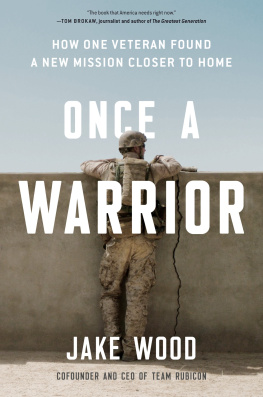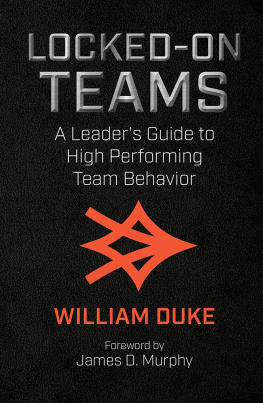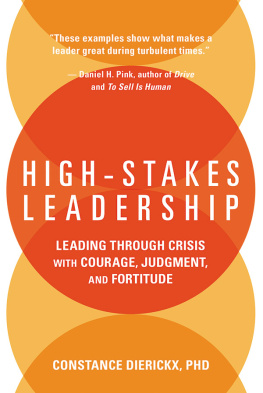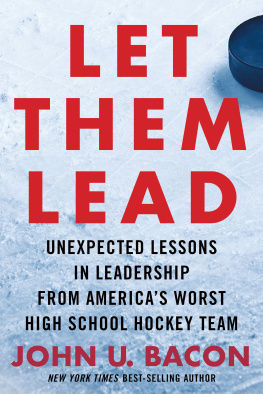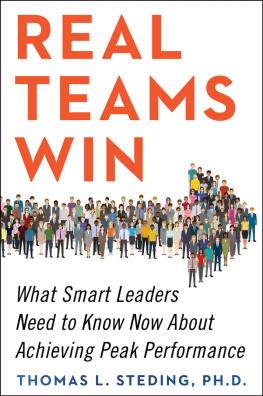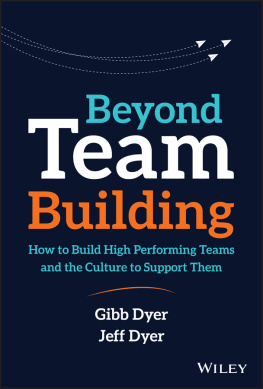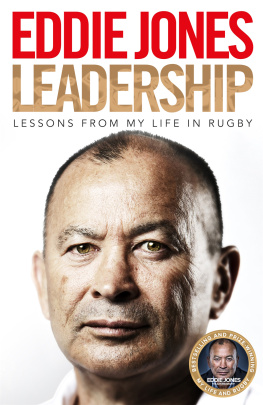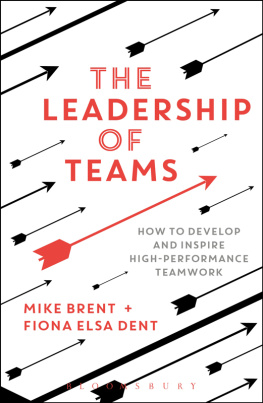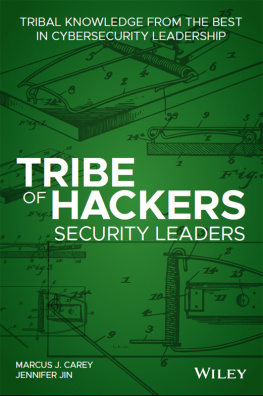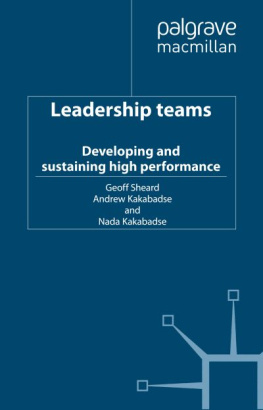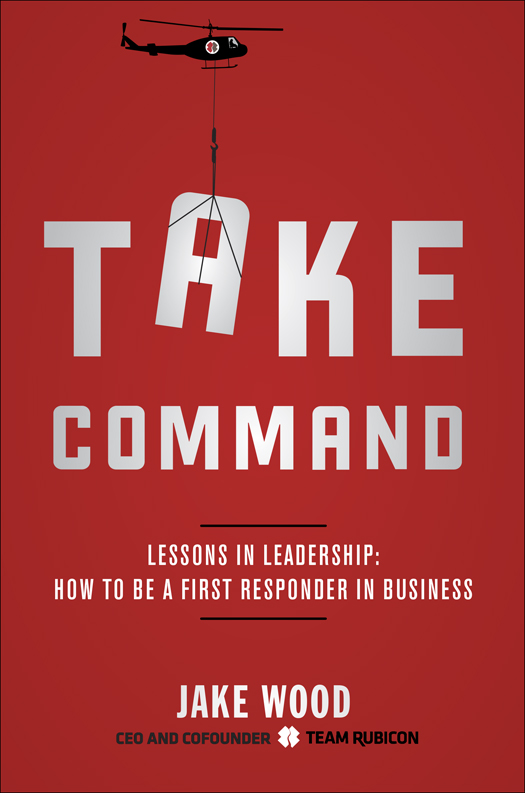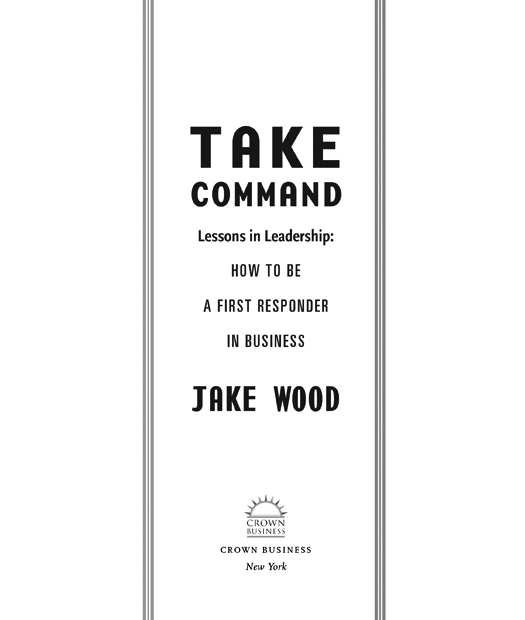All rights reserved.
Published in the United States by Crown Business, an imprint of the Crown Publishing Group, a division of Random House LLC, a Penguin Random House Company, New York.
www.crownpublishing.com
CROWN BUSINESS is a trademark and CROWN and the Rising Sun colophon are registered trademarks of Random House LLC.
TAKE COMMAND
Of every one hundred men in battle, ten should not even be there. Eighty are nothing more than sheep. Nine are the real fighters, we are lucky to have them since they make the battle. Ah, but the oneone is the Warriorand he brings the others home.
HERACLITUS, APPROXIMATELY 500 BC
This book is about how to be that one of the hundred, whether on the literal battlefield or the figurative battlefield of business. Its about how to prepare yourself to fight in the face of extreme pressure and uncertainty. How to find and lead the nine who make the battle. And, ultimately, how to bring them all home, victorious. We cant all be warriors, but we can all be leadersno matter our functionin todays high-stakes world of business.
INTRODUCTION
February 18, 2007
My eyes stinging with sweat, my gaze flittered back and forth between the still-blazing Humvee and the men standing around me. For a moment, I didnt know what to do. Moments earlier I had just been a Marine lance corporal, only slightly higher ranking than a private, riding in the vehicle commanders seat of a Humvee, three trucks back from the front of a vehicle-mounted mission to aid a platoon of Marines stuck in the mud in a dangerous area outside of Fallujah, Iraq. Now, two weeks into my first combat deployment, I was kneeling over the dead body of a friend, Lance Corporal Blake Howey, unsure of what the next move was.
When the first truck had struck the roadside bomb, Id thought it was just a blown engine. The brief flash of light didnt register and my body couldnt quite feel the concussive blast of the explosion through the thick steel armor of my vehicle. It wasnt long, however, before the chaos consumed us. Id grabbed my rifle and stepped out of my Humvee, and as I sprinted forward toward the now burning vehicle, I passed my squad leader, Sergeant Rosenberger. Sergeant Rosenberger had been in the truck that was hit, and his leg was bleeding from a massive piece of shrapnel as a result. Calm, cool, and collected, Sergeant Rosenberger asked me for a radio.
Rose, youre hit! Id exclaimed, looking at his leg.
Wood, just get me a friggin radio, hed replied, attempting not to put any weight on his bloodied limb. Id pointed Sergeant Rosenberger toward my truck and explained that we had a PRC-119 radio up and running next to the seat I had just left, and with that, Rosenberger stomped away. Moments later I would run across a burning bridge toward the blazing Humvee, dodging pools of burning fuel along the way.
Thats how I found myself kneeling in a puddle of blood over the body of a deceased friend, dragged there moments earlier by two other wounded and dazed Marines. By this time Doc Campanali was by Howeys side, gingerly checking for signs of life. Soon after, Corporal Williams came across the bridge from the second truck, just as it became entirely engulfed in raging flames. We were now cut off from the rest of our squad, alone.
Suddenly, my instincts kicked in. We were vulnerable. We were cut off. We had no radios, and a wide canal separated us from the rest of the unit. Looking around, I saw a situation that desperately needed leadership, yet no one was taking charge. Sensing the void left by Sergeant Rosenberger, I stood up. Hey, Payne, grab security down that way, watch for a follow-on attack, I said, pointing down the road wed been on. Latcher, move thirty feet that way and protect the flank. I looked at Corporal Williams, technically the highest-ranking Marine on site, and saw uncertainty. I saw hesitation. This was his second deployment and he outranked me, yet I sensed that he wasnt prepared to lead, right at that critical moment when we needed a leader in the worst way. Thats when I knew I had to Take Command.
In 2005 I had just completed four years at the University of Wisconsin, where Id watched two wars unfold from the comfort of my living room. While tens of thousands of young men and women my age were off fighting and dying in places with names like Najaf and Korengal, I was playing football games in places like Iowa City and Happy Valley. As the Battle of Fallujah raged live on CNN and Fox News, I specifically remember seeing men who looked just like me covered in dirt, grime, and blood as they moved their ragged squads from house to house, fighting entrenched insurgents around every corner. Leadership, I thought to myself, must be at a premium over there. Id always thought of myself as a leader. So a few short months after graduation I raised my right hand, swore an oath, and enlisted into the Marine Corps infantry.
During my time on the Wisconsin Badgers football team, I thought Id cut my teeth when it came to leadership (despite ending up a fairly average football player). I worked hard and did things the right way, and although nobody was looking to me when games were on the line, I was nonetheless looked to for guidance at other times, both on and off the field. And I no doubt learned some incredible leadership lessons playing football for the demanding Barry Alvarezsome of which you will read in this bookbut that moment standing over my friends mangled, bleeding body on February 18, 2007, changed my perspective on what leadership can and should be. I came to realize that while it might feel like the world is hanging in the balance when there are thirty seconds left in the fourth quarter and your team is down 2427, I had never truly had it all on the line. The Marines were my chance to find out if I had what it takes to lead when the stakes truly are high.
That momentthat brief flash of light in front of mechanged the course of my life forever. That night in Iraq simultaneously tested almost every component of my leadership mettleinitiative and judgment, fortitude and bearing, decisiveness and the courage to act, and every other quality necessary for high-stakes leadershipin a way that only combat can. This experience didnt make me a leader; nor did it show me that I already knew how to lead. Rather, it revealed to me the type of leader I needed to be.
At thirty years old, I am no longer a warrior and will likely never be one again. Today I am the cofounder and CEO of Team Rubicon, a volunteer nonprofit organization born during a phone call with a fellow Marine, William McNulty, just hours after a devastating earthquake hit Haiti. Only roughly a year after returning from my final combat tour in Afghanistan, I found myself watching the chaos unfold in Port-au-Prince, and, just as I had while watching the Battle of Fallujah rage years earlier, I felt an urge to go, to help, to make a difference.


